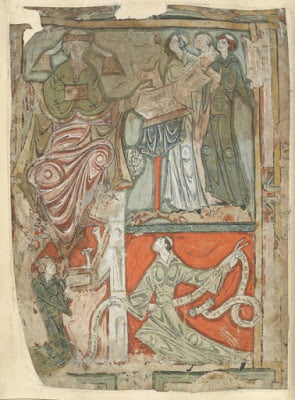“Through God’s Word the monastics are trained in a discipline of heart and action to be responsive to the Holy Spirit and so attain purity of heart and a continual mindfulness of God’s presence” (CST 2). This is a profound statement given right at the beginning of our Order’s Constitutions, which explicate the ‘nature and purpose’ of Cistercian monastic life. How can we be responsive to the Holy Spirit, how can we attain purity of heart, how can we be mindful of God’s presence without silence? Obviously in a monastery there is to be more than a modicum of silence in the outer environment. Further, what of the silence within our heart’s depths? Surely a modicum of silence there is not enough! Let me add one more sentence from our Constitutions: “Living in solitude and silence they aspire to that interior quiet in which wisdom is born” (CST 3). Who does not want ‘interior quiet’? And then who does not want to receive and be motivated by the voice of wisdom? This voice of wisdom escapes a noisy interior life!
Sr. Aquinata Bockmann has an excellent commentary on RB 6 in her book: Tools of Good Works to the Heart of Humility. I offer this morning excerpts from her commentary and I will conclude with a suggestion for this coming week. She writes:
“Silence enables…listening and good words; silence is the womb for the word” (p.101).
“If monachus signifies to be one, then the importance of silence is clear so that the restless voices inside and outside can be quieted. An important tool for doing this is to guard one’s tongue” (p.103).
“Keeping silence also means not to judge. When we are silent we know we stand before God and do not make comparisons” (p.103).
“‘I was silent about good things.’ Those who want to share everything good that arises in them become talkative and eventually garrulous. Here the emphasis is on discretion, on recollection, and on the fact that when words are born out of silence they are authentic” (p.112).
“As motivation for keeping silent, we see in RB 6 avoiding sins in order to listen, to find inner recollection, and perhaps to facilitate words that can be life-giving. We would add: in order to strengthen unity in the community” (p.121).
Bockmann notes that it is “apt to view silence as a virtue of wisdom” (p.121). She supports this by indicating that in RB 5 most of the scriptural references are from the New Testament where in RB 6 this changes and the scriptural references are from the wisdom literature.
“We also grow together in silence, not only when we communicate with each other. Bonhoeffer says: The word that creates a new community and unifies it is only a word that emerges out of silence” (p.123).
Indeed Sr. Aquinata’s words tease out the essence of silence as put forth in chapter 6 of the Rule. Even though this chapter of the Rule is on ‘silence’, in my view, this chapter could as well be titled: ‘Cherishing Silence for the Sake of the Word’! Let us, then, hold in our consciousness this reality: that ‘silence and the word’ belong together.
I propose for this coming week, that we give special attention to the practice of silence. Observe the words that we speak: have they come out of this ground of silence or do we notice that they have the noise of anxiety, of busyness, of judgments toward a sister? Notice what happens when we just sit in silence…do we get quiet enough to hear the ‘silent still voice of the Spirit’? Pay particular attention when listening to God’s Word at Mass or during lectio, can we sense the silence that is woven into Jesus’ words? The Word of Life is a word born out of silence…it is a Spirit infused Word and thus this word woven with silence is always a word of Life, a word of healing, a word of compassion, a word that forgives and unites. Amen.


